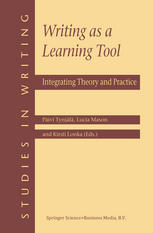

Most ebook files are in PDF format, so you can easily read them using various software such as Foxit Reader or directly on the Google Chrome browser.
Some ebook files are released by publishers in other formats such as .awz, .mobi, .epub, .fb2, etc. You may need to install specific software to read these formats on mobile/PC, such as Calibre.
Please read the tutorial at this link: https://ebookbell.com/faq
We offer FREE conversion to the popular formats you request; however, this may take some time. Therefore, right after payment, please email us, and we will try to provide the service as quickly as possible.
For some exceptional file formats or broken links (if any), please refrain from opening any disputes. Instead, email us first, and we will try to assist within a maximum of 6 hours.
EbookBell Team

4.7
56 reviewsIn a brief summary, the debate concerning the nature of writing processes is about whether the essential characteristic of expertise in writing is a matter of mastering problem-solving strategies. In this respect, the role of social and interactive factors, such as writers' familiarity with the particular genre in which they are writing and their relationship with the discourse community in which they are participating, have been pointed out (e.g. Nystrand, 1989). According to the socio-interactive approach, which refers to Vygotsky's theory, the composition process is a dialogue between the writer and the reader made possible by socially shared knowledge. The meaning of a text is a social construct that is negotiated between the reader and the writer through the medium of the text. The importance of motivational aspects has also been highlighted by two main lines of research, studies of the relationship between writing and self-efficacy (e.g. Pajares & Johnson, 1994, 1996) and studies of the role of interest in the production of expository texts (e.g. Albin, Benton & Khramtsova, 1996; Benton, Corkill, Sharp, Downey, Khramtsova, 1995; Hidi & McLaren, 1990, 1991). Self-efficacy, in this context individuals' beliefs about their ability to produce certain types of texts, have been found to be predictive of writing skills, strategy use and writing performance.